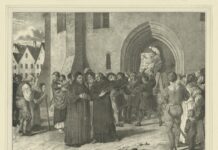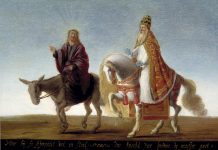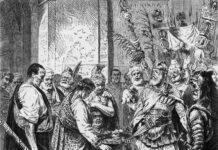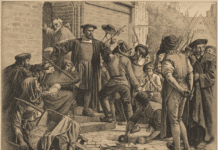
Socialistisk Biblioteks Tidslinje med links til begivenheder og personer i 1783.
Se også Index over personer, organisationer/partier og værker (som bøger, malerier, mm.), steder, begivenheder, mv., der er omtalt på hele Tidslinjen, titler og indhold på emnelisterne osv.
24. juli 1783
Simon Bolivar fødes i Caracas, Venezuela (dør 17. december 1830 Santa Marta, Columbia).
Se på Socialisisk Bibliotek:
Emnelisten: Hugo Chávez og den ’bolivariske revolution’ i Venezuela .
Personlisten: Simon Bolivar (1783-1830)
3. september 1783
Uafhængighedskrigen 1775-1783 (“Den amerikanske revolutionære krig” / Den Nordamerikanske Frihedskrig) afsluttes med traktaten i Paris.
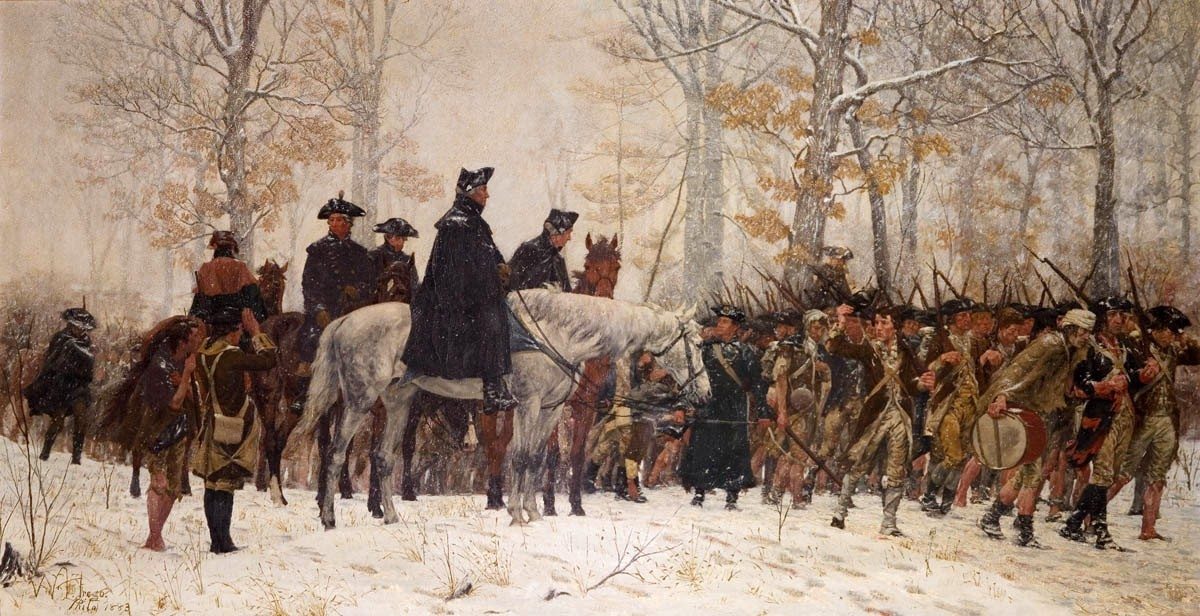
Se:
- Tidslinje i Den amerikanske revolution. Red. Mikkel Thorup mfl. (Slagmark, 2012, 249 sider) (Slagmarks Revolutionsserie).
- Den amerikanske Revolution (Denstoredanske.dk)
- American Revolutionary War (Wikipedia.org)
- The American Revolution. Part 46 in Neil Faulkner: A Marxist History of the World (Counterfire, 12 September 2011)
Den amerikanske uafhængighedskrig. Af Jens Andersen (Socialistisk Arbejderavis, 30. april 2021) (Almindelige menneskers historie, del 16). “… de britiske ministre besluttede at en del af udgifterne til krigen [1756-63] skulle betales af de amerikanske kolonier. De indførte derfor en række skatter og afgifter på bl.a. importvarer. Det førte til oprør mod kolonimagten og uafhængighed.”
Den amerikanske revolution: revolution med paryk på. Af Nicolai von Eggers, Mathias Hein Jessen og Mikkel Thorup (Baggrund.com, 24. oktober 2012). “Kan en revolutionær gå med pudret paryk, eje slaver og primært være oprørt over skatten på te? Når det kommer til Den amerikanske revolution er svaret paradoksalt nok ja.”
Taking up the American Revolution’s egalitarian legacy. By Taylor Clarke (Jacobin, July 4, 2024). “Despite its failures and limitations, the American Revolution unleashed popular aspirations to throw off tyranny of all kinds. Reviving that legacy today means challenging the arbitrary power of employers.”
Historian Woody Holton launches 1619 Project-inspired attack on the American Revolution. By Tom Mackaman (World Socialist Web Site, 16 September 2021). “The University of South Carolina historian holds that the American Revolution was launched to defend the institution of slavery against the British Empire.”
“When the Declaration says that all men are created equal, that is no myth”: An interview with historian Gordon Wood on the New York Times’ 1619 Project. By Tom Mackaman (World Socialist Web Site, 28 November 2019)
Slavery and the American Revolution: A response to the New York Times 1619 Project. By Tom Mackaman (World Socialist Web Site, 1 November 2019). “My task is this evening is to address the 1619 Project’s attack on the American Revolution and its principles.”
The cause of mankind. By Sean Collins (Spiked Review, September 2017). Review of Jonathan Israel, The Expanding Blaze: How the American Revolution Ignited the World, 1775-1848 (Princeton University Press, 2017, 768 p.): “The American Revolution changed the world, and it isn’t finished yet.”
In defense of the American Revolution. By Tom Mackaman (World Socialist Web Site, 14 July 2016). “The American Revolution was the first great world event that put a question mark over slavery.”
Slavery and the American Revolution. By Paul Prescod (Against the Current, Issue 178, September-October 2015). Review of Gerald Horne, The Counter-Revolution of 1776: Slave Resistance and the Origins of the United States of America (NYU Press, 2014, 363 p.). “The result is a book that will forever change the way you view the founding of the United States.” See also review by Jay Moore: A history of a counter-revolution (MR Online, April 2, 2015) + review by Alan Gilbert (The International Marxist-Humanist, July 15, 2015) + Ross Wolfe: 1776 – revolution or counterrevolution?: Recent challenges to the classical narrative (The Charnel-House, July 2, 2014). See the book online at Libcom. And the longer review article by Fred Schleger: Gerald Horne’s counter-revolution against 1776 (World Socialist Web Site, 17 March 2021). “Horne’s scholarship does not stand up to the slightest scrutiny.”
Interview with Gordon Wood on the American Revolution, Part 1-2 (World Socialist Web Site, 3-4 March 2015). “Gordon Wood is a leading scholar of the American Revolution. His book, The Radicalism of the American Revolution, won the Pulitzer Prize in 1993, and his Creation of the Republic, 1776-1787 won the Bancroft Prize in 1970.”
1776 in world history: The American Revolution as bourgeois revolution. By James M. Vaughn (Platypus Review, Issue 62, December 2013–January 2014). “The American Revolution was a vital step in the revolt of the Third Estate and the project for a universal humanity—that is, in the unfolding of the bourgeois revolution.”
Enjoy the same liberty: Black Americans and the revolutionary era. By Neil Faulkner (Counterfire, 18 May 2012). Review of Edward Countryman’s book (Rowman and Littlefield, 2011, 187 p.). “A new book on black Americans in the revolutionary war of independence reveals the contradictory nature of bourgeois revolution, and rescues forgotten heroes of liberation.”
Class struggle and the American Revolution. By John Peterson (In Defence of Marxism, 14 December 2011). “The Americans carried through the bourgeois democratic revolution on a scale never before seen in history.”
The American Revolution (Chapter II in Alan Woods: Marxism and the United States, Wellred, 2005; online at In Defence of Marxism). “When the American colonists raised the flag of revolt against the English Crown, this was a very revolutionary act.”
The pursuit of ‘unbounded freedom’. By Megan Trudell (International Socialism, Issue 92, Autumn 2001, p.141-148). Review of Ray Raphael, The American Revolution: A People’s History (Profile Books, 2001, 384 p.). “Raphael has written a thoughtful and fascinating account of the revolution from the point of view of real participants.”
Who made the American revolution? By Megan Trudell (International Socialism, Issue 73, Winter 1996, p.73-93). Review of Theodore Draper, A Struggle for Power: the American Revolution (Little Brown, 1996, 544 p.). “Draper’s study traces the causes of the revolution back to the colonial arrangement with Britain. It takes us in great detail through the growing tensions that ultimately led to the colonies uniting to force the break with their imperial master, researched from many contemporary pamphlets and the letters of British officials from both sides of the Atlantic as well as, to a lesser extent, the writings of leading colonists.”
The meaning of the American Revolution (pdf). By Kit Adam Wainer (IIRE Working Paper, Issue 7, January 1990, 19 p.)
America also had a Revolution: a review article. By Harry Braverman (American Socialist, September 1956)
Sam Adams and the American Revolution. By Harry Frankel [i.e. Harry Braverman] (The Militant, November 12, 1951 – March 3, 1952). Series of articles.
The movement for American independence. By William F. Ward [i.e. George Novack] (Fourth International, Vol.11, No.4, July-August 1950, 122-126)
Class forces in the American Revolution. By Harry Frankel [i.e. Harry Braverman] (Fourth International, Vol.6, No.3, March 1946, p.89-93)
How the Constitution was written. By Harry Frankel [i.e. Harry Braverman] (Fourth International, Vol.7, No.4, April 1946, p.118-121)
The American Revolution. Chapter 2 in Albert Weisbord: The Conquest of Power (New York, Covici-Friede, 1937)
Se også:
Tremendous in his wrath. By Eric Foner (London Review of Books, Vol.41, No.24, 19 December 2019). Review of Mary Thompson, ‘The Only Unavoidable Subject of Regret’: George Washington, Slavery and the Enslaved Community at Mount Vernon (The University of Virginia Press, 2019, 520 p.).
Slavery and the American Revolution: A response to the New York Times 1619 Project. By Tom Mackaman (World Socialist Web Site, 1 November 2019). “My task is this evening is to address the 1619 Project’s attack on the American Revolution and its principles.”
American Independence Day 2019: From the ‘asylum for mankind’ to the land of concentration camps. By Tom Mackaman (World Socialist Web Site, 4 July 2019). “The American Revolution thus enshrined the Enlightenment concept known as jus soli, or birthright citizenship. If you are born in the United States, you are a citizen.”
Two hundred forty years since the Declaration of Independence. By Andre Damon (World Socialist Web Site, 4 July 2016). “The victory of the American Revolution provided the ideological and political impetus for the French Revolution and all subsequent democratic, egalitarian and socialist movements.” See also Tom Mackaman: A reply to our critics: In defense of the American Revolution (ibid., 14 July 2016)
Not our Independence Day (Jacobin: Reason in Revolt, 4 July 2016). Interview with William Hogeland: “The Founding Fathers were more interested in limiting democracy than securing and expanding it.”
The coming of the American Revolution: 250 years since the Stamp Act.
By Tom Mackaman (World Socialist Web Site, 24 March 2015). “The Stamp Act, as it became known, imposed a tax on all paper products—from newspapers and pamphlets to professional licenses to playing cards—sold in Britain’s American colonies.”
The American War of Independence: three films. By Mark Glancy (Historyextra.com)
Litteratur:
Den amerikanske revolution. Red. Mikkel Thorup mfl. (Slagmark, 2012, 249 sider) (Slagmarks Revolutionsserie). Kildesamling. Med indholdsfortegnelse, redaktionelt forord og tidslinje online.
Se også:
One, two, three revolutions. By Jack Conrad (Weekly Worker, Issue 1103, 21 April 2016)
Se også på Socialistisk Bibliotek:
- Emneoversigten: USA /United States of America
- Tidslinjen august 1619, om de første afrikaneres ankomst til Amerika.
- Tidslinjen 4. juli 1776, om den amerikanske Uafhængighedserklæring.
- Linkboxen Den amerikanske borgerkrig og Abraham Lincoln
- Linkboxen Oplysningstiden / The Enlightenment
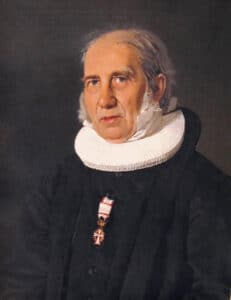
8. september 1783
Den danske salmedigter, præst og folkeopvækker Nikolai Frederik Severin (N.F.S.) Grundtvig fødes i Udby ved Vordingborg. (Dør 2. september 1872).
Se:
- N.F.S. Grundtvig (Wikipedia.dk)
- N.F.S. Grundtvig. Af Christian Todberg (Denstoredanske). Længere artikel.
- Grundtvig, N.F.S. Af Mette Elsig Olsen (Litteratursiden.dk, 2005)
- N.F.S. Grundtvig. Af Pia Andersen (Forfatterweb, 2005)
- Grundtvig, Nikolaj Frederik Severin (Religion.dk)
- Grundtvigianisme (Wikipedia.dk)
- Center for Grundtvigsforskning (Aarhus Universitet)
- Grundtvigs Forum (Grundtvig.dk)
Nicolai Frederik Severin Grundtvig, 1783-1872. Af Bertel Nygaard (Danmarkshistorien.dk, 22. september 2014). “N.F.S. Grundtvig var en dansk præst, digter og politisk skikkelse. Hans tanker om folkelighed, religiøs tro, samfundsliv og nationalitet har fået afgørende betydning for dansk åndsliv, politisk kultur, folkeoplysning, kirkeliv og tro.”
Grundtvigianismen i Danmark. Af Bertel Nygaard (Danmarkshistorien.dk, 22. september 2014). “Grundtvigianismen er en social, kulturel og idémæssig strømning med udgangspunkt i den danske teolog og digter N.F.S. Grundtvigs tanker. Den har udviklet sig i mange former og har fået stor betydning for dansk offentligt liv samt forståelser af politik, samfund, folkelighed og religiøs tro.”
N.F.S. Grundtvigs verden, efter 1783. Af Lea Marie Wierød og Kathrine Bergild (Danmarkshistorien.dk, 22. september 2014). “I dette tema tager vi konsekvensen af Grundtvigs grundlæggende tværfaglighed og præsenterer en række vidt forskellige fagligheders spændende vinkler på manden og hans virkningshistorie. Temaet samler artikler om, hvordan Grundtvig er blevet opfattet gennem tiden, men også om, hvordan Grundtvig opfattede sin verden.”
Esben Lunde Larsens afhandling om Grundtvig er endnu en pinlighed. Af Henning Tjørnehøj (Politiken.dk/Kronik, 18. november 2015). “Afhandling om Grundtvigs folkelighed er et bidrag til et historisk bedrag.” Under betalingsmur.
Fra Grundtvig til Kaj Munk. Af Klaus Riis (Kommunistisk Politik, 24, 2000). “Som en af de centrale ideologiske skikkelser i den nationale bevægelse ved fødslen af den nuværende kapitalistiske nationalstat i 1848, med Tysklandskrigene og kampen om Slesvig-Holsten, er Grundtvig stadig et omdrejningspunkt for den borgerlige og småborgerlige nationalisme.”
Grundtvigs folkelighedsbegreb. Af Jeppe Berg Sandvej (Faklen, nr.14, januar 2000, s.32-43). “Det for tiden meget omdiskuterede begreb ‘danskheden’ skyldes i høj grad Grundtvig, hos hvem det indgår i en kontekst af kristen og national forkyndelse og vækkelse. Med antagelsen af en særlig dansk ‘folkeånd’, et dansk folkefællesskab, som formuleres snævert og eksklusivt, installeres fædrelandskærlighed og kulturchauvinisme som moralsk pligt og politisk dekret …”
Grundtvig var ikke folkeven men bondeven. Af Henning Tjørnehøj (Information.dk, 26. september 1998). “Grundtvig var ligeså socialt blind, som han var åndeligt seende og frisindet.”
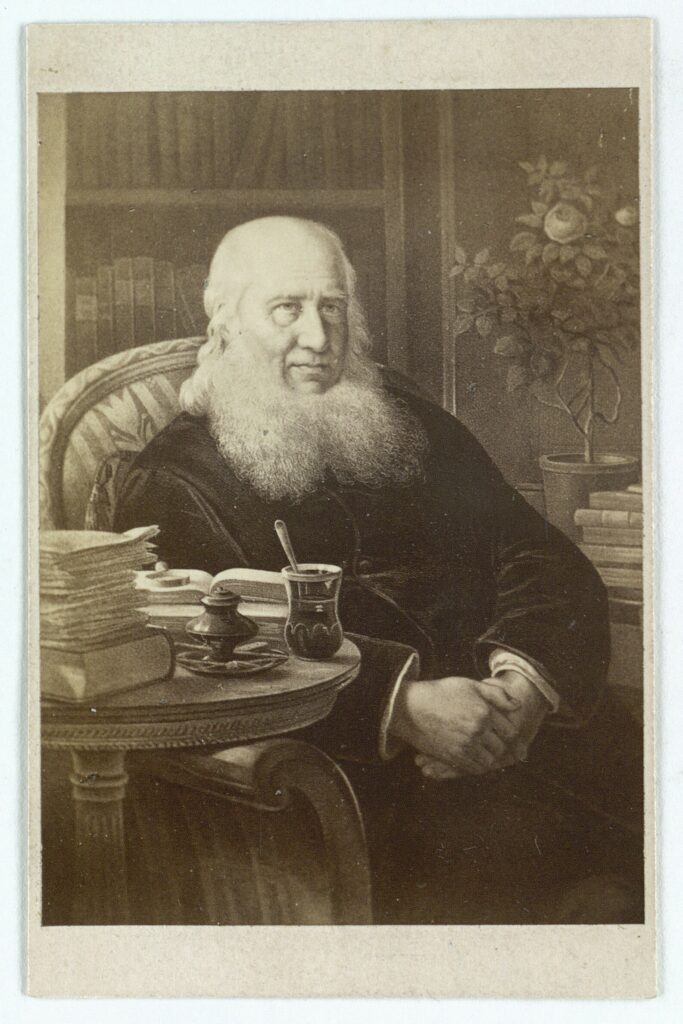
Litteratur:
Grundtvig: biografi og breve. Af Edward Broadbridge og Hans Raun Iversen (Aarhus Universitetsforlag, 2024, 569 s.). Se indholdsfortegnelse, litteratur og noter online.
Den store mand: nye fortællinger om Grundtvig. Red. Lone Kølle Martinsen (Gads Forlag, 2022, 352 s.).
Grundtvigs død. Af Jes Fabricius Møller (Aarhus Universitetsforlag, 2019, 100 s.) (100 danmarkshistorier). Se indholdsfortegnelse, litteratur og noter online.
Grundtvig rundt: en guide. Af Ove Korsgaard (Gyldendal, 2018, 304 s.).
På afstand: forskydninger mellem Grundtvig og Luther. Red. Ove Korsgaard og Michael Schelde (Eksistensen, 2017, 213 s.). Se bogens Forord (s.9-14).
Frihed til det fælles bedste: en oppositionel stemme fra fortiden. Af Regner Birkelund (Aarhus Universitetsforlag, 2008, 685 s.).
Det levende ord. Om Grundtvig. Af Ejvind Larsen. (Rosinante, 1983, 335 sider). “.. forsøgt at bringe hm … i direkte samtale med Marx og marxismen og med Freud, Jung og psykonalysen” (bagside-tekst).
Frederik: en folkebog om N.F.S. Grundtvigs tid og liv. Af Ebbe Kløvedal Reich (Gyldendal, 1972, 401 s.)
Se også på Socialistisk Bibliotek:
Linkboxen: Oplysningstiden
















